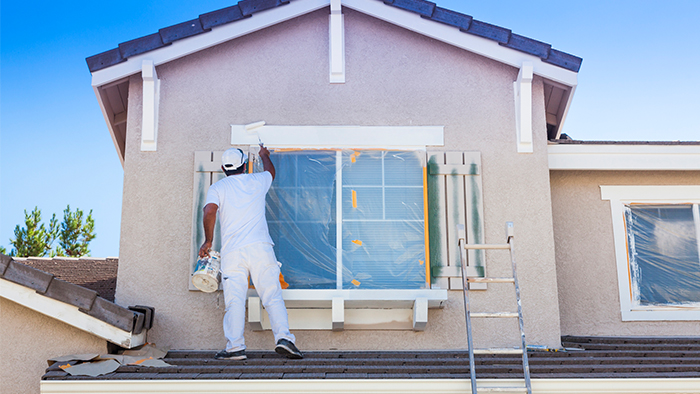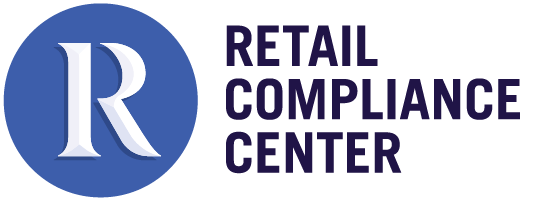Home Improvement
This area covers retailers that sell products for home improvement, lawn and garden or farming, and/or rent tools or outdoor power equipment. These types of retailers face environmental issues related to waste and hazardous waste; product compliance for pesticides, paints, plumbing parts, and other products; and stormwater. In addition, environmental regulations for managing potentially hazardous materials such as lead and asbestos can apply to stores that offer home repair or renovation services.
COMPLIANCE CONSIDERATIONS
Hazardous Waste

Many items sold at home improvement stores and garden centers may be considered hazardous waste when returned, expired, recalled, or damaged. Improper disposal of hazardous products, such as by pouring them down the drain, on the ground, in storm drains, or putting them in the trash, can be potentially dangerous and against the law. State and local regulations can differ from federal requirements, so it is important to always check the rules in a store's jurisdiction.
Before disposing of products, especially chemical products, it is critical to determine which might be considered hazardous waste. Federal and state hazardous waste regulations outline a hazardous waste determination process. For more information on hazardous waste determination, visit RCC's Hazardous Waste page.
If in doubt and there is any suggestion from product labeling that an item might be hazardous waste, it may be prudent to assume it is hazardous waste. For example, there is a significant chance that products with package labeling that contains signal words like "Danger," "Poison," "Toxic," "Corrosive," or "Flammable" may be hazardous wastes. Signal words such as "Warning" or "Caution" indicate the product poses some degree of risk and therefore might also be a hazardous waste. Retailers should evaluate these products more closely or may wish to simply assume they will be hazardous waste when disposed. The following common home improvement products may in many instances be classified as hazardous wastes when disposed:
- Oil-based paints
- Spray paints
- Paint thinners and mineral spirits
- Paint strippers
- Alcohols, such as denatured alcohol and isopropyl alcohol
- Pool chemicals
- Insect repellents/pesticides
- Aerosol spray cans
- Furniture polish
- Drain cleaner
- Oven cleaner
- Tub and tile cleaner
- Toilet bowl cleaner
- Lime removal chemicals
- Carpet and upholstery cleaners or spot removers
- Bleach
- Disinfectants
- Ammonia, possibly including some glass cleaners
- Air fresheners
- Roofing tar
- Caulking compounds
- Glues
- Smoke detectors
- Cement products
- Flooring mastic
Many stores work with their waste hauler or a consultant for hazardous waste determination and waste management, and some manufacturers take back products.
Pesticides
Home improvement and garden centers typically sell pesticides. Pesticides, which include any product that claims to destroy or repel a pest, including bacteria, are regulated by the EPA under the Federal Insecticide, Fungicide and Rodenticide Act (FIFRA) and also by state and local governments. There are a number of potentially applicable requirements for the registration, labeling, and handling of pesticides. The RCC FIFRA Fact Sheet has more information.
Federal Insecticide, Fungicide and Rodenticide Act Fact Sheet
View Fact SheetStormwater Management
Outdoor storage of products may have the potential to harm water quality as stormwater can pick up debris, sediment, and spilled products, such as fertilizers or pesticides, and carry the pollutants into streams and other water bodies. To protect water quality, facilities may have to meet federal, state, or local requirements for preventing contamination and minimizing stormwater runoff.
In a garden center or outdoor storage area, best management practices may include cleaning up spills immediately, not hosing down paved areas, and covering storage areas that have the potential to contaminate stormwater. When rental equipment is cleaned, wash water should not be flushed to the curb or storm drain. Rather it should be sent to a floor drain that discharges to the sanitary sewer; or to the extent possible the equipment should be cleaned without water. Some states are very strict about the storage of fertilizers, pesticides, and even potting soil with fertilizer outside, and require a roof and four walls to prevent precipitation from picking up pollutants. The RCC Water page has more information on stormwater requirements.
Product Compliance
Many home improvement related products must meet content limits or other restrictions. The sale of paints and many other products with VOCs above certain levels is prohibited in some states and regions. The Safe Drinking Water Act (SDWA) limits the content of lead in brass and other plumbing parts sold in the U.S. Some states have stricter lead-content standards than those mandated under federal law. The NSF International certification organization has more information on lead content certifications. Some states' SWDA programs also require back flow prevention valves on some faucets and other plumbing fixtures.
There are also efficiency standards for water-using fixtures and appliances under federal and state laws. The National Conference of State Legislatures has more information on state standards for water efficient plumbing fixtures. EPA’s voluntary WaterSense program identifies water efficient products.
Fertilizers
The sale of fertilizers is regulated at the state and local level. (Fertilizers with weed killer and other pesticides are also covered under FIFRA as discussed above.) State regulations are concerned with consumer protection, labeling, protecting human health and the environment, and proper fertilizer handling and application. Fertilizers are regulated at the state level because soil conditions vary dramatically from state to state across the country.
Storage and proper management of fertilizers and other nutrients for gardening are important for groundwater and stormwater management. To protect the products from getting wet, it is helpful to ensure that storage areas are always dry, and away from floor or storm drains. It is also helpful to have spill cleanup material readily available so that spills or leaks can be cleaned up as soon as possible.
Home Repair

Federal and state regulations govern lead-based paint and asbestos removal, for example, in housing and public spaces. Retailers that provide home/building repair or renovation services should ensure that they hire qualified asbestos abatement contractors who practice proper asbestos management and safety standards. The resulting asbestos waste must be handled as required by EPA or the state.
When renovating or repairing a home or building built before 1978, it is essential to evaluate the lead-based paint hazards and determine if abatement will be necessary. EPA's Lead Renovation, Repair and Painting Rule (RRP Rule) requires that firms performing renovation, repair, and painting projects that disturb lead-based paint in homes, child care facilities, and preschools built before 1978, have their firm certified by EPA (or an EPA authorized state), use certified renovators who are trained by EPA-approved training providers, and follow lead-safe work practices The state you operate in may have more stringent lead rules, so be sure to check with the state agency regulating lead.
Tool Rental and Outdoor Power Equipment
This area covers environmental issues related to the sale or rental of powered equipment and used oil management from equipment maintenance. If your store transports rental equipment that contains fuel, batteries, or even some chemicals, you may be required to follow Federal Hazardous Materials Regulations for transporting hazardous materials by highway. For equipment containing fuel, the fuel tanks need to be securely closed to prevent fuel from leaking. Batteries must be securely installed and fastened in an upright position and protected against short circuits and leakage, or removed and packaged separately. The RCC Hazardous Materials Transportation Page has more information.
EPA has emission standards for gasoline and diesel powered lawn and garden equipment (handheld equipment and non-handheld) that is used for rental or offered for sale. State and local regulations can be stricter than the federal regulations.
Used oil must be handled according to EPA’s good housekeeping requirements.
Emergency Planning
Under the Emergency Planning and Community Right-to-Know Act (EPCRA), facilities that are required to maintain safety data sheets (SDSs) for hazardous chemicals under Occupational Safety and Health Administration (OSHA) regulations, and that store such chemicals in quantities above certain thresholds, must submit the SDSs and annual chemical inventories to their state and local emergency planning committees and local fire department, and make the information available to the public.
Stores with battery powered equipment, such as forklifts, personnel lifts, and powered pallet jacks, may be subject to Tier II reporting under EPCRA if the aggregate weight of sulfuric acid in the lead acid batteries exceeds the reporting threshold. It does not take many large forklift batteries to exceed the reporting threshold. Other hazardous materials that could trigger Tier II reporting and must be reported include (but are not limited to) gasoline, diesel fuel, propane, LP gas, and other compressed gases. The EPA provides guidance on Tier II reporting. Acid spill kits and eye wash stations should be located near charging stations for large lead-acid batteries.
Spill kits should be maintained at all facilities using petroleum and other liquids, and minor spills should be absorbed with sawdust, rags, etc. and disposed of as special or hazardous waste depending on what spilled. Larger spills should be contained and collected. The state is generally responsible for determining the proper avenues for cleaning up large spills. You should be familiar with both federal and state spill reporting requirements. The RCC Spill Reporting Matrix has a summary of state requirements for the reportable quantity.
Spill Reporting Matrix
View MatrixSUSTAINABILITY
Retail facilities may be able to reduce compliance and disposal costs, as well as regulatory risks, by promoting or offering products that do not have the potential to become hazardous wastes. In some cases, products with the potential to become hazardous wastes have counterparts that do not.
There is a push to replace cleaning products and chemicals with less hazardous versions. The EPA's Safer Choice program (formerly Design for the Environment) identifies products that are less hazardous. Standards addressing other environmental or related attributes include Green Seal, USDA Organic, and USDA Biopreferred. Selling products that are less hazardous or have other favorable environmental or related attributes can also enhance a company's brand.
Related Content
Spill Reporting Matrix
Summary of state requirements for reporting spills of oil or hazardous substances, including reporting quantity and contact information.
Federal Insecticide, Fungicide and Rodenticide Act
Detailed look at the management, enforcement, and disposal of pesticides under FIFRA.
Tags
-
Air
-
Chemical Ingredients and Labeling
-
Hazardous Waste
-
Water
-
Pesticides



